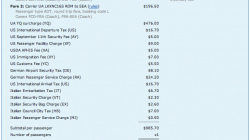I was contacted two weeks ago by a reporter at The Economist who wanted to do a piece on fuel dumping for Gulliver, their business travel column. His email was pretty clear that he didn’t want any 3Xs, but rather was looking for insight into how and why it actually works. I talked to him for about 30 minutes and gave him the best explanation I could, but I didn’t expect it to ever get published since he seemed to be looking for a level of technical detail that only an airline or organization like the ATPCO (Airline Tariff Publishing Company) would be able to provide.
And while some people will probably send me hate mail for talking to him at all, he already had a fair understanding of how fuel dumping works just by reading the forums on FlyerTalk and elsewhere. I don’t think I gave him anything new other than a quote. My attitude can be summed up by our conversation at the end of the call, when he asked if I had any reservations about the article: “Frankly, I think most readers of The Economist have better things to do with their time. If you have other ways to earn money, it makes more sense to do that and pay a higher fare. But for some people, it’s a challenge. It’s fun.”
I don’t fuel dump anymore. I know other people who don’t fuel dump anymore, or who are very selective. Apparently United has been running audits on some people’s reservations and following up with phone calls. American has always made it difficult to apply upgrades since they are processed manually, creating an opportunity for review.
And by and large the tricks have become more difficult to find and implement, such that the opportunity cost of getting started and maintaining a stable of working tricks is rarely worth the financial savings. The traditional 3X is now often replaced with more complicated substitutes, and ITA is no longer the “easy” way to search for fuel dumps that it once was.
The airlines are apathetic, too, which is why fuel dumping is still around. Piecemeal fixes have always been possible when a trick gets too popular, but larger fixes aren’t possible without significant IT investment. Do you really think United is going to attack a small leak like fuel dumping when it can’t manage its own day-to-day operations? How many mistake fares (both revenue and award) did it have this year? They have bigger concerns.
And indeed most of the big holes have been plugged, with Airfare Watchdog making a splash before I even figured it out. It’s difficult enough that beginners find it harder and harder to find that first dump that keeps them motivated to continue. The marginal cost of fixing the remaining holes is prohibitive unless an airline starts to attract a significant number of bookings. There are audits that notice this kind of thing. If an airline normally sells 10 tickets a day on the Miami-London route and now it’s selling 100 — while tickets with other East Coast departures remain stable — that looks suspicious.
I don’t think fuel dumping is going to end any time soon. It is just not what it once was and hasn’t been for a long time. Which is why I tell people who want to get started, it’s great if you find it fun and entertaining, but don’t expect to take a stab at it this weekend and book a trip on Monday morning. Do it because you like a puzzle.

